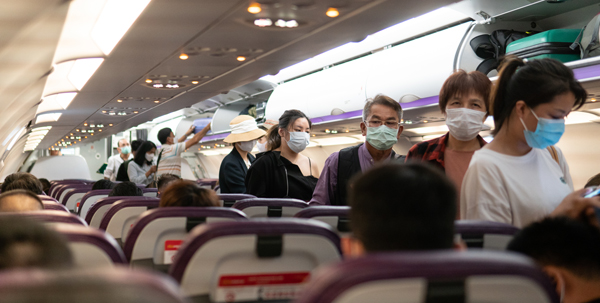Current Outbreak of Coronavirus Disease
Summary: An update for the US State Department on the current state of Coronavirus and related travel precautions.

Current Outbreak of Coronavirus Disease 2019
There is an ongoing worldwide outbreak of a respiratory illness first identified in Wuhan, China, caused by a novel (new) coronavirus. On February 11, 2020 the World Health Organization announced an official name for the disease that is causing the current outbreak of coronavirus disease, COVID-19.
What is COVID-19?
Coronavirus disease 2019 (COVID-19) is caused by a virus (more specifically, a coronavirus) identified as the source of an outbreak of respiratory illness first detected in Wuhan, China. Early on, many of the patients in the outbreak in Wuhan, China reportedly had some link to a large seafood and animal market, suggesting animal-to-person spread. However, a growing number of patients reportedly have not had exposure to animal markets, indicating person-to-person spread is occurring.
What we recommend
U.S. citizens are urged to:
- The Department of State’s Travel Advisory for China is currently a Level 4- Do Not Travel to China due to novel coronavirus.
- Avoid contact with sick people.
- If you decide to travel to China discuss your travel with your healthcare provider. Older adults and travelers with underlying health issues may be at risk for more severe disease.
- Avoid animals (alive or dead), animal markets, and products that come from animals (such as uncooked meat).
- Wash hands often with soap and water for at least 20 seconds. Use an alcohol-based hand sanitizer if soap and water are not available.
- Follow local authority instructions.
- Closely monitor Travel.state.gov and CDC.gov for important information.
Before you travel
Due to the current public health situation, many countries have begun implementing strict screening procedures in order to prevent the spread of the COVID-19.
- Any U.S. citizen returning to the United States who has been in Hubei province, China in the previous 14 days may be subject to up to 14 days of quarantine.
- Any U.S. citizen returning to the United States who has been in the rest of mainland China within the previous 14 days may undergo a health screening and possible self-quarantine.
- Please read these Department of Homeland Security supplemental instructions for further details.
- U.S. citizens are encouraged to monitor media and local information sources and factor updated information into personal travel plans and activities. You may also follow us on Twitter and Facebook.
- If you travel, you should enroll in the Smart Traveler Enrollment Program to receive updates.
Presidential Proclamation on Novel Coronavirus
On Friday, January 31 President Trump signed a proclamation barring entry to the United States of most foreign nationals who traveled to China within the past 14 days. The proclamation is in effect as of February 2. This action follows the declaration of a public health emergency in the United States related to the COVID-19 outbreak in Wuhan, China. The full text of the presidential proclamation is available on the White House website.
Passengers on Cruise Ships
U.S. citizens should reconsider travel by cruise ship to or within Asia. U.S. citizens planning travel by cruise ship elsewhere should be aware that, due to the current public health situation, many countries have implemented strict screening procedures in order to prevent the spread of the novel coronavirus that causes COVID-19. This is a dynamic situation and U.S. citizens traveling by ship may be impacted by travel restrictions affecting their itineraries or ability to disembark, or may be subject to quarantine procedures implemented by the local authorities. While the U.S. government has successfully evacuated hundreds of our citizens in the previous weeks, repatriation flights should not be relied upon as an option for U.S. citizens under the potential risk of quarantine by local authorities. U.S. citizens should evaluate the risks associated with choosing to remain in an area that may be subject to quarantine and take the appropriate proactive measures. Passengers who plan to travel by cruise ship should contact their cruise line companies directly for further information on the current rules and restrictions, and continue to monitor the Travel.state.gov website and see the latest information from the CDC: https://wwwnc.cdc.gov/travel/page/cruise-ship-asia.
China
On January 30, the Department updated the Travel Advisory for China from a Level 3: Reconsider Travel to Level 4: Do Not Travel due to COVID-19 first identified in Wuhan, China. In an effort to contain the COVID-19, the Chinese authorities have suspended air and rail travel in the area around Wuhan. On January 31, the Department of State ordered the departure of all family members of U.S. personnel under age 21 from China. The U.S. government has limited ability to provide emergency services to U.S. citizens in Hubei province.
We strongly urge U.S. citizens in Hubei Province, China, to contact concerned family members in the United States and elsewhere to advise them of your safety.
Hong Kong
On February 8, the Hong Kong government began enforcing a compulsory 14-day quarantine for anyone, regardless of nationality, arriving in Hong Kong who has visited mainland China within a 14-day period. This quarantine does not apply to individuals transiting Hong Kong International Airport and certain exempted groups such as flight crews. However, health screening measures are in place at all of Hong Kong’s borders and the Hong Kong authorities will quarantine individual travelers, including passengers transiting the Hong Kong International Airport, if the Hong Kong authorities determine the traveler to be a health risk. The Hong Kong government temporarily closed certain transportation links and border checkpoints connecting Hong Kong with mainland China and suspended ferry services from Macau. On February 10, 2020 the Department of State allowed for the voluntary departure of non-emergency U.S. government employees and their family members due to COVID-19 and the impact to U.S. Consulate personnel as schools and some public facilities have been closed until further notice.
If you need assistance in China
- U.S. citizens in Hubei Province, China who need emergency assistance can contact the U.S. Embassy at [email protected].
- To provide us with information about a U.S. citizen who is in Hubei Province, you may:
- Contact the Department of State at [email protected]?.
- Call 1-888-407-4747 toll-free in the United States and Canada or 1-202-501-4444 from other countries from 8:00 a.m. to 8:00 p.m. Eastern Standard Time, Monday through Friday (except U.S. federal holidays).
First Published: Feb 24, 2020


